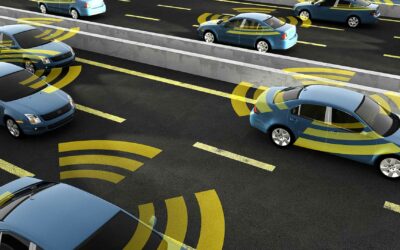Back in 1995, the idea of self-driving trucks had been brought up for use by the military. The idea used a potent combination of ground-speed sensors, satellites, and more to create what would’ve been a semi-autonomous truck convoy where the lead would be the only truck driven by a human being. That had only just been an idea.
Fast forward to today, and a number of major companies are making the move to either test or implement semi-autonomous or fully autonomous trucks. Caterpillar Inc. is aggressively pursuing the technology to automate their trucks, both in the construction and mining sectors., Meanwhile, major automotive company Volvo has been developing their own futuristic-looking autonomous truck called the Vera for freight logistics. Even the delivery company UPS is field testing autonomous trucks in their attempt to pioneer the future of delivery—in fact, they’ve already made successful cargo deliveries with trucks provided by the startup company TuSimple.
When Will Self-Driving Trucks Go from Prototype to Official?
Nothing as of now. Self-driving trucks are still in development and have a long way to go before they’re able to reach full implementation. Even with the successful operation of prototypes from several companies, these tests have not been without incident as crashes have occurred, often at the fault of the self-driving truck. Some issues that need to be sorted out include the reliability of the sensors used on these self-driving trucks, much like the issues that are currently plaguing self-driving car prototypes.
It is currently predicted that self-driving cars have another two or three decades before they start seeing more mainstream adoption. Chances are self-driving trucks will hit the scene around then as well, since both types of vehicles are seeing a swell of startups rise to the challenge of fully realizing the concept.
Will Truck Drivers Still Have a Job?
The simple answer is yes. Self-driving trucks won’t mean that truck drivers won’t be needed—even with automated systems, a truck driver will likely still be needed as a backup for if the vehicle fails. In fact, the companies that have been currently testing their prototypes have stated just as much, saying that their models would require a truck driver to be present at all time. The closest analogy to how this may work in the future would be a truck driver becoming more and more like an airplane pilot, just instead of a plane, it’s a truck that’s going on autopilot during the less-eventful period of a trip from Point A to Point B.
Benefits of a Self-Driving Truck Industry
Perhaps the most talked-about benefit of a truck industry outfitted with self-driving vehicles is the vision of accident-free highways and freeways. While these vehicles are still in an early-prototype phase, it is likely that such a future can be achieved within the next few decades. This can make a great impact on the lives of many as truck accidents are one of the most destructive and devastating kinds of vehicle accidents. Along with a heightened chance of debilitating, lifelong injuries, truck accidents also have a much higher chance of killing a driver in a smaller vehicle. A perfected system would have trucks ensuring perfect distance from surrounding traffic while providing a safety net for tired truck drivers, leading to less accidents by truck blind spots and drivers falling asleep at the wheel.
Find the Best Truck Accident Lawyers Near You with TopResearched!
A truck accident can lead to incredibly high medical bills and a great deal of suffering, pain that can even last a lifetime. But whether it’s you that is injured or a loved one that you have lost at the hands of a negligent truck driver, you should know that there is a way to make sure you’re getting the most compensation possible for your terrible experience. But you won’t need to worry about searching for hours on search engines to find the best truck accident lawyers with TopResearched, you can find the very best all in one place, in our stringently analyzed and verified lists of truck accident lawyers!
